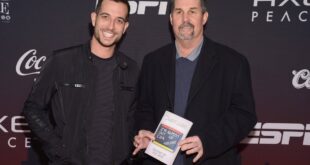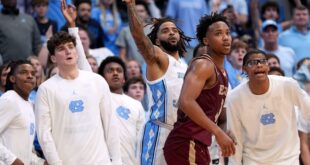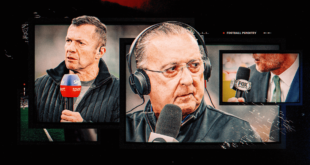The Charlotte Hornets’ first home preseason game felt more like it was being played 600-plus miles northeast, between Seventh and Eighth Avenues in Manhattan.
Blue and orange garb overpowered teal and white inside the Queen City’s Spectrum Center. There were more Jalen Brunson and Patrick Ewing jerseys than LaMelo Ball and Kemba Walker. The loudest cheers of the night came for the road team, and intensified when second-round Knicks rookie Tyler Kolek scored his first unofficial NBA points.
New York fans love their basketball team, especially their rookies. They take pleasure in taking over another team’s domain. Since 2001, though, they’ve sat through more seasons with 30 or fewer wins than playoff appearances. They haven’t seen their team get beyond the second round of the postseason since the start of the new millennium. That’s why the season ahead means so much.
The Knicks’ roster, on paper, features one of the best starting lineups in basketball, equipped with players in their primes, including a 6-foot-1 point guard who finished top five in MVP voting a season ago. They added arguably the two best wings in basketball who have never made an All-Star team. And earlier this month, New York added one of the best shooting big men to ever play. The front office is making shrewd decisions. The coach is a proven winner, with a combined 97-67 record over the last two seasons and consecutive trips to the Eastern Conference semifinals.
Knicks fans have spent the last 20-plus years loving something that hasn’t always loved them back. But this time, it feels mutual.
In the parking lot of Commack High in the spring of 1995, the voice of Mike Breen on WFAN was blasting inside a white 1987 Nissan Pulsar, drowning out the harmonic melodies of “Waterfalls” by TLC and the youthful bliss of the school’s junior prom. The Knicks were playing in the postseason. Jason D’Angelo and his friend Barry Dworkin, then both 17, were diehard fans. Their friendship, which started in middle school, revolved around their favorite basketball team. They cared very little about anything else.
With the car’s T-top down and a crisp spring breeze zipping through the interior, as their high school friends made lifetime memories inside, the best friends cranked the dial and let Breen narrate their night.
“I can tell you we definitely did not have dates,” D’Angelo said. “That wasn’t us.”
D’Angelo is now 46. His Knicks fandom now rivals what it once was, though the many losing seasons caused D’Angelo’s interest to drop periodically over the years. Having children and a family did, too.
Thinking back, D’Angelo wishes he’d known he was in the good old days before they were over. Back then the Knicks were one of the NBA’s elite teams, making the Eastern Conference semifinals five times, conference finals four times and the NBA Finals twice between 1992 and 2000.
Yet even amid one of the greatest periods in franchise history, D’Angelo knew there was a ceiling.
“We were never getting past Michael Jordan and the Bulls,” he said. “The fact that 1994 … was a year he wasn’t around, only cemented that. If he was playing, there was just no way. We were never good enough. Patrick Ewing is a Hall of Famer, but he wasn’t Michael Jordan.”
“And even to get past the Chicago team without him, it took an imaginary foul from (Scottie Pippen) on Hubert Davis just to get us to that point.”
Even with his expectations carefully calibrated, D’Angelo believed that one day the Knicks would get over the hump. That one day, when Jordan was gone, it would be New York’s turn.
After the 1997-98 season, the Knicks unloaded Charles Oakley to the Toronto Raptors for Marcus Camby and sent John Starks to the Golden State Warriors for Latrell Sprewell. The Pat Riley team the city had fallen in love with was fading. “It didn’t feel the same,” D’Angelo said.
That new iteration of Knicks basketball still made its mark, going to the NBA Finals during the 1998-99 lockout season, despite finishing as the No. 8 seed. The Knicks lost in the Finals to the dominant San Antonio Spurs and followed that up with a 50-32 season and an Eastern Conference finals appearance.
“I think people were expecting decent things, but nothing great,” D’Angelo said. “Camby was unproven. Sprewell, the season before, missed like 70 games because he choked P.J. Carlesimo. Ewing was getting older.”
Still, D’Angelo never would have predicted that, after the 2000 season, the Knicks would go another 20-plus years without beating their chest.
“I know a lot of people like to blame (owner) James Dolan,” he said. “Blaming Dolan is like blaming your mom when you go to therapy. Some of the blame does lie there. I think he was too loyal at times when it came to Isiah Thomas, and I think Isiah Thomas put us in a very bad spot, whether it was trades that didn’t work or contracts that didn’t work. They ended up being a stop for end-of-road former stars. The front office, I thought, was looked at as a joke.”
From 2000-01 to the 2019-20 season, the Knicks had just four years in which they finished with a regular-season record above .500. There were a lot of low points, but D’Angelo didn’t need any time to think about the moment that stung the most.
“Firing Phil Jackson eight days after letting him make the Frank Ntilikina pick in the draft — those were lean years for me,” D’Angelo said. “How would they let a guy make this pick and then he’s gone eight days later? That makes no sense at all.”
Now, after over two decades’ worth of confusion, D’Angelo has never been prouder to be a Knicks fan. Why? Competence. The current New York regime has spent the last few years showing that the organization now has one of the more forward-thinking front offices in sports.
“People trust Leon Rose,” D’Angelo said. “If you look at what Brock Aller has done with the financials, even in just this deal with Karl-Anthony Towns, he worked some incredible financial magic. … That was the kind of thing that we were missing.”
D’Angelo and Barry are still best friends. The team’s recent revitalization has them doing a podcast together, “It’s a Hard Knicks Life.” It started in 2017 as a safe haven to vent their frustration, but the podcast’s mood shifted in 2021 as the Knicks made the playoffs for the first time in eight years.
Even in the most exciting stretches of D’Angelo’s life as a Knicks fan, nothing ever quite felt like this.
“Players want to be here now,” D’Angelo said. “It’s not the same organization that it used to be.”
Ray McConville grew up in a non-sports household. At a young age, though, the Staten Island native gravitated to the Knicks.
“At the time, even growing up in New York in the 1990s, there were a lot of Bulls fans,” McConville, now 41, said. “It wasn’t universal Knicks love … there were a lot of people who were Jordan fans as well. As a kid, that drove me nuts. I’d come home from school complaining, ‘Mom, why do all these kids root for the Bulls? I hate them so much.’ And she’s just like, ‘What are you even talking about?’”
McConville was 16 in 1999, when the Knicks last made the NBA Finals. Those runs brought about excitement for the young New Yorker, but the Spurs of that era were far superior to the Knicks; the Indiana Pacers were gearing up for a second wind. Just when it felt like the Jordan window was opening up, other teams were on the rise.
“Knicks fans are a pretty self-aware bunch,” McConville said. “I like to say we’re not pessimistic and we’re not optimistic. We’re just realistic. At the time, you knew the team was on its last legs. It didn’t feel like we had another 10-year run ahead of us. It felt like we were at the end of an era.”
The moment that sticks with him is when New York traded Ewing to Seattle in 2000. Despite Ewing’s decline, McConville thought the organization should have let him finish his career in New York, or at least let him leave as a free agent so he could pick his team and have an opportunity to win a title.
The Ewing trade brought the Knicks bad draft picks and multiple players with long-term contracts. It began a trickle-down effect of New York living in salary-cap jail with players who weren’t going to move the needle.
For several years, starting around the 2003 season, McConville admits that while his Knicks fandom remained strong, he wasn’t as tuned in to the games. He was a young adult. There were better things to do than go out of his way to watch a team that had to scratch and claw for 30-plus wins.
“If I was home and had nothing else going on, I’d watch those late-March games when they’re going absolutely nowhere,” McConville said. “I have a hard time remembering a lot of those teams, which is probably for the best.”
Despite the horror stories of being a Knicks fan in the 2000s and 2010s — for McConville, they hit rock-bottom during the 23-59 season when Larry Brown was the coach — he found pockets of excitement that made him remember why he could never fully leave.
In the summer of 2010, LeBron James was a free agent, and many New Yorkers hoped the King would come to town. McConville said he never fully convinced himself that James would, but he held out hope. When the dust settled and James chose the Miami Heat, the Knicks ended up with five-time All-Star Amar’e Stoudemire. It wasn’t a bad consolation prize.
New York got off to a slow start with Stoudemire, winning just three of its first 11 games, until a switch flipped and the team then rattled off 13 wins in 14 games. McConville was once again hooked. After a 129-125 win over the Denver Nuggets and Carmelo Anthony — who would be traded to New York later that season, and became the sole source of joy for most fans in the years following — the Knicks had an opportunity to re-emerge as juggernauts, with back-to-back games against the Celtics and James’ Heat.
“It felt like basketball mattered again,” McConville recalled. “Like Madison Square Garden was once again worthy of the Mecca name.”
New York lost both games, including a high-scoring matchup against the Celtics that came down to the final possession.
“It was the worst I felt in a really long time after a game,” McConville said. “I went to bed depressed, woke up and for a brief moment forgot about it. Then I remembered it and felt awful. It ruined me for days. Part of me was like, ‘OK, well, I kind of miss this.’”
McConville, a season-ticket holder for 15 years, is back to being obsessed. He believes that what is ahead for the Knicks could rival the run from his teenage years.
“The new regime has proven to be very smart,” he said. “It’s not just smart basketball guys in there, but smart dorks, respectfully, in the front office managing small details. They’ve proven that they can be trusted. I don’t get worried waking up and wondering, ‘Oh my god, what did they do?’”
For 30-plus years, Floyd Converse has been waiting to share an experience like this with his children. The 64-year-old who was raised in Westchester County and now resides in Manhattan was entering his teen years when the Knicks started dominating, winning NBA championships in 1970 and 1973.
A diehard Knicks fan for over 50 years, Converse passed down his love to his two sons when they were little — only for them to hear about how great it once was to be a Knicks fan, but never experience it themselves.
“Matthew, my youngest son, it’s been torture for him,” Converse said of the 25-year-old. “He used to say, ‘I thought they were supposed to be really good.’”
The last few years for the Knicks have evoked emotions in Converse that he hasn’t felt in decades, though he still cheers with cautious optimism.
“Being a fan right now, there is so much scar tissue from recent history,” Converse said. “People my age are holding back the enthusiasm.”
As for his children, this is the most exuberance they’ve had as fans in their lifetime. Converse and Matthew were considering going to a New York Yankees playoff game two weeks ago, but decided they’d rather save their money for Knicks games.
Converse has endured in a half-century of fandom, but what was nearly the final straw came in 2019, when he was at Madison Square Garden watching the Houston Rockets take on the Knicks. New York was in the midst of its second 17-win season in five years. The Rockets were magnitudes better. In front of Converse’s eyes, James Harden dropped 61 points in the victory.
Converse had a moment many fans can relate to, telling his kids, “I’m not coming back for years.”
“We just had so far to go to be good, and it’s expensive to go to the Garden,” Converse said.
But he could never really quit his Knicks.
The team’s recent stretch has given Converse some of his greatest moments as a fan. He was deeply invested in Donte DiVincenzo and his pursuit last season of the franchise record for made 3s in a season, which he got by March. Trading away Converse’s most recent favorite player hurt, but he understands it means the organization has its sights set on something greater. And after all these years, that’s all he’s wanted.
“Every decision management has made the last few years, in terms of personnel, I think it’s paid off very well… it feels like we’re in contention,” Converse said. “The expectations are reset, but I’m still reluctant to buy in.”
Converse remembers previous heartbreaks, none more painful than the 1993 Eastern Conference finals against the Bulls. The series was tied and Game 5 was at the Garden, where New York had won 27 straight. With 20 seconds left and the Bulls up by one, Ewing dropped a pass off to Charles Smith who, by ruling, was then blocked four times in a matter of seconds. Chicago would go on to win the game and series.
Converse and many New Yorkers saw it a different way.
“Everyone who is a Knicks fan with gray hairs remembers that Charles Smith was fouled in that game against the Bulls,” Converse said. “We got so close. You kind of give up a little bit.”
This is why Converse approaches the most anticipated season in Knicks recent history with some caution. He’s seen too much. He’s been tricked into believing something real was around the corner one too many times. But at the end of the day, he’s still a fan.
No matter what happens this season, Converse and his boys are ready for this ride. And, for once, they get to do it together.
(Illustration by Meech Robinson: The Athletic; photos by Andrew D. Bernstein
Nathaniel S. Butler, Jeyhoun Allebaugh, Jeff Zelevansky, Nathaniel S. Butler, Sarah Stier/Getty Images and Theo Wargo/WireImage)
Source link
 meganwoolsey Home
meganwoolsey Home





